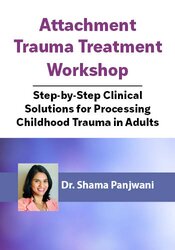
×

The echoes of childhood pain leave profound scars that can last a lifetime.
But treating the resulting trauma isn’t easy and comes with clinical challenges like intrusive memories, emotional dysregulation, and fears of abandonment or intimacy that hurt their relationships.
And while attachment theory is informative, it doesn’t translate that knowledge into effective practice.
That’s why I created this exciting new training so you can fully understand how attachment trauma impacts your clients PLUS be fully prepared to treat them and achieve amazing results.
In just one day, you’ll get powerful techniques from mindfulness, guided memory exercises, and trauma-informed narrative therapy. I’ll break it all down for you – step by step – so you’ll know exactly what to do and when.
And because we all work with clients from diverse backgrounds, I’ll make sure you have the tools to adapt these strategies for everyone, including those from marginalized communities.
Don’t miss this chance to help your clients break the cycle of attachment trauma, reclaim their self-worth, and foster meaningful connections.
I can’t wait to see you there – register now!
Dr. Shama Panjwani
Psychotherapist and Professor at Keiser University
All members of the PESI, Inc. planning committee have provided disclosures of financial relationships with ineligible organizations and any relevant non-financial relationships prior to planning content for this activity. None of the committee members had relevant financial relationships with ineligible companies or other potentially biasing relationships to disclose to learners. For speaker disclosures, please see the faculty biography.
Continuing education credit information is coming soon for this live webcast.

Dr. Shama Panjwani, is a counselor and expert in trauma-informed care, specializing in attachment, immigration, and intergenerational traumas. She combines holistic wellness with traditional methods to ensure culturally competent practices. Dr. Panjwani is a faculty member at Keiser University and the owner of SoHolisticEnergy Counseling & Consultation, LLC, where she provides culturally responsive services and consults on Diversity, Equity, and Inclusivity (DEI).
With a PhD in counselor education from Mercer University, Dr. Panjwani is a certified and licensed professional counselor. Her research focuses on mental health stigma, trauma, and social justice. With over nine years of experience, she conducts workshops to enhance access to effective care for the BIPOC community.
Speaker Disclosures:
Financial: Dr. Shama Panjwani has employment relationships with Keiser University and SoHolistic Energy Counseling and Consultation, LLC. She receives a speaking honorarium from PESI, Inc. She has no relevant financial relationships with ineligible organizations.
Non-financial: Dr. Shama Panjwani is a member of the American Counseling Association, the National Board of Certified Counselors, the Association of Counselor Education and Supervision, and the Counselors for Social Justice.
For live CE credit, you must watch the live webcast in its entirety at its scheduled time and complete the CE quiz and evaluation within one week. You will have access for 90 days after the program for review.
Please note: There will be a 70-minute lunch and two 15-minute breaks; one in the morning and one in the afternoon. Lunch and break times will be announced by the speaker and at their discretion. A more detailed schedule is available upon request.
Visit our FAQ page at https://www.pesicanada.ca/faq or contact us at https://www.pesicanada.ca/contact-us.
Satisfaction Guarantee
Your satisfaction is our goal and our guarantee. Concerns should be addressed to info@pesicanada.com.
Please wait ...